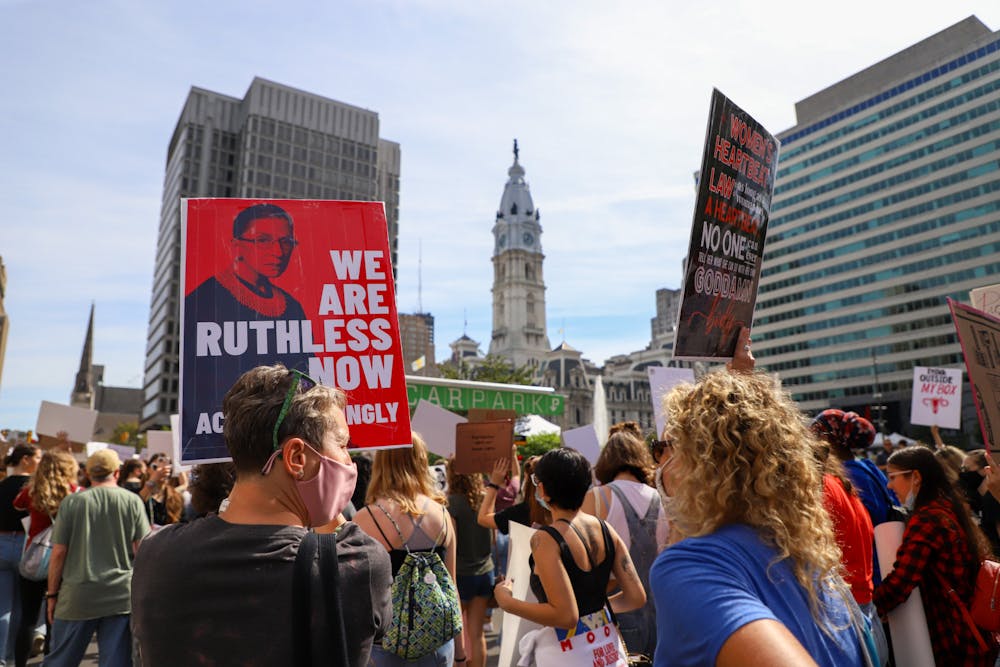On Jan. 22, Pennsylvania state representatives announced legislation aimed at reforming statewide abortion access.
The bill, which was introduced on the 51st anniversary of Roe v. Wade, seeks to overturn Act 122 of 2011 — which is also known as a Targeted Regulation of Abortion Providers law. Under TRAP laws, abortion facilities are required to adhere to the same regulations as ambulatory surgical centers, including mandates on parking lot designs, hallway widths, recovery room structures, and plumbing and ventilation systems.
Pennsylvania state Rep. Tarik Khan (D-Philadelphia), the primary author of the proposed bill — who received a doctorate from the University of Pennsylvania School of Nursing in 2022 — told The Daily Pennsylvanian that the requirements mandated by TRAP laws result in expensive building costs for abortion facilities. By overturning these regulations, he expects more clinics to open and increased accessibility for those seeking abortion care.
“[Act 122] was passed in an effort to restrict abortion and to deny access to abortion,” Khan said. “It was not rooted in science. It was not rooted in research. It was not rooted in safety.”
College junior and Penn Reproductive Justice co-founder Antoilyn Nguyen expressed support for the proposed legislation. They highlighted the current challenges faced by individuals seeking abortion care in the state of Pennsylvania, particularly within minority and underrepresented communities.
“When we remove these barriers to care, or these barriers that make it harder to get an abortion, this is allowing us to trust whoever needs the care in the first place and allowing more people to access the care that we believe is a human right,” Nguyen said.
TRAP laws have faced opposition from various medical organizations, including the Guttmacher Institute and the American College of Obstetricians and Gynecologists, who argue that they lack a foundation in scientific research.
Abortion rights advocates, including Planned Parenthood PA Advocates and the Women's Law Project, have also voiced their support for Khan’s proposed legislation — which Khan hopes will be officially introduced in the state House of Representatives this spring.
RELATED:
Campus reproductive justice organization holds event on dialogue around abortion
Penn Carey Law professor to represent coalition challenging anti-abortion law
Eleven representatives have signed on to Khan’s bill as co-prime sponsors.
“When I knock on their door throughout the 157th [District], people want the government out of their bedrooms, out of their medical decisions,” co-sponsor and state Rep. Melissa Shusterman (D-Chester) told the DP. “They want their daughters, sisters, and wives to be able to access health care. And abortion is health care.”
Opponents of revising the legislation argued that regulations were put in place for a reason, citing the 2011 case of Kermit Gosnell — a West Philadelphia doctor who ran an illegal late-term abortion clinic — and concerns about nine Pennsylvania abortion facilities failing health inspections in 2023.
“Until the legislature put those requirements on abortion facilities following the Gosnell scandal, abortion clinics were less regulated than nail salons in Pennsylvania,” Pennsylvania Family Institute President Michael Geer wrote in a Jan. 22 statement. “We cannot allow this horrific history to repeat itself.”
In the wake of Dobbs v. Jackson — the Supreme Court decision which overturned Roe v. Wade — Pennsylvania has witnessed a notable increase in abortion procedures, with over 1,000 more abortions in 2022 than 2021. Shusterman attributed this trend to individuals traveling from neighboring states seeking abortion care.
In a Jan. 29 ruling, the Pennsylvania state Supreme Court did not fully recognize abortion access as a constitutionally protected right, but left the issue open for potential future considerations. In 2022, attempts by Republican lawmakers to amend the state constitution and explicitly exclude the right to an abortion were unsuccessful.
Co-sponsor and state Rep. Heather Boyd (D-Delaware), who cited the 2011 TRAP law as a primary reason for her choice to run for office, acknowledged the partisan divide within the current legislative landscape, especially on the subject of abortion. Given Pennsylvania's divided state legislature — with Democrats controlling the state House of Representatives and Republicans the state Senate — Boyd told the DP that passing abortion legislation in Pennsylvania faces challenges.
“[Democrats] have to continue to push for the values that we hold as legislators and do what the people elected us to do,” Boyd said. “I do think that we have to start the process, or it'll never happen.”
RELATED:
Campus reproductive justice organization holds event on dialogue around abortion
Penn Carey Law professor to represent coalition challenging anti-abortion law
Staff reporter Sameeksha Panda covers Penn Medicine and can be reached at panda@thedp.com. At Penn, she studies chemistry.
Jasmine Ni is the Executive Editor of The Daily Pennsylvanian, Inc. and can be reached at ni@thedp.com. At Penn, she studies English and political science. Follow her on X @JasmineNi_.









